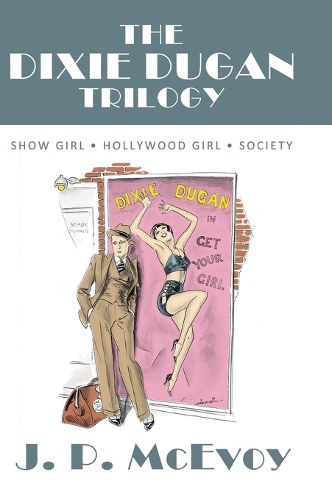Readings Newsletter
Become a Readings Member to make your shopping experience even easier.
Sign in or sign up for free!
You’re not far away from qualifying for FREE standard shipping within Australia
You’ve qualified for FREE standard shipping within Australia
The cart is loading…






This title is printed to order. This book may have been self-published. If so, we cannot guarantee the quality of the content. In the main most books will have gone through the editing process however some may not. We therefore suggest that you be aware of this before ordering this book. If in doubt check either the author or publisher’s details as we are unable to accept any returns unless they are faulty. Please contact us if you have any questions.
Between 1928 and 1932, J. P. McEvoy published six ingenious novels that unfold solely by way of letters, telegrams, newspaper articles, ads, telephone transcriptions, scripts, playbills, greeting card verses, interoffice memos, legal documents, monologues, song lyrics, police reports, and radio broadcasts. Three of them, collected here for the first time, record the wild career of a jazz baby named Dixie Dugan (modeled on actress Louise Brooks, whom McEvoy knew). The best-selling SHOW GIRL tracks Dixie's zigzagging path to success on Broadway; in HOLLYWOOD GIRL, she heads out West for further risque adventures, and impulsively marries a rich playboy; in SOCIETY, Dixie mingles with high society both in Europe and the U.S. before returning to Hollywood to resume her show-biz career.
Beneath the novels' hellzapoppin' energy and jazzy lingo, however, McEvoy exposes the dark underside of the times: sexual predation, tabloid journalism, political corruption, the rise of religious fundamentalism, and the fatuous lifestyles of the rich and famous. But it's the blend of humor and bite, of success and failure, of ridicule and irony-shaken and stirred with linguistic and formal ingenuity-that makes The Dixie Dugan Trilogy "a madcap, mordant masterpiece," as critic Steven Moore writes in his informative introduction. Out of print since the 1930s, these "avant-pop" novels deserve a revival.
$9.00 standard shipping within Australia
FREE standard shipping within Australia for orders over $100.00
Express & International shipping calculated at checkout
This title is printed to order. This book may have been self-published. If so, we cannot guarantee the quality of the content. In the main most books will have gone through the editing process however some may not. We therefore suggest that you be aware of this before ordering this book. If in doubt check either the author or publisher’s details as we are unable to accept any returns unless they are faulty. Please contact us if you have any questions.
Between 1928 and 1932, J. P. McEvoy published six ingenious novels that unfold solely by way of letters, telegrams, newspaper articles, ads, telephone transcriptions, scripts, playbills, greeting card verses, interoffice memos, legal documents, monologues, song lyrics, police reports, and radio broadcasts. Three of them, collected here for the first time, record the wild career of a jazz baby named Dixie Dugan (modeled on actress Louise Brooks, whom McEvoy knew). The best-selling SHOW GIRL tracks Dixie's zigzagging path to success on Broadway; in HOLLYWOOD GIRL, she heads out West for further risque adventures, and impulsively marries a rich playboy; in SOCIETY, Dixie mingles with high society both in Europe and the U.S. before returning to Hollywood to resume her show-biz career.
Beneath the novels' hellzapoppin' energy and jazzy lingo, however, McEvoy exposes the dark underside of the times: sexual predation, tabloid journalism, political corruption, the rise of religious fundamentalism, and the fatuous lifestyles of the rich and famous. But it's the blend of humor and bite, of success and failure, of ridicule and irony-shaken and stirred with linguistic and formal ingenuity-that makes The Dixie Dugan Trilogy "a madcap, mordant masterpiece," as critic Steven Moore writes in his informative introduction. Out of print since the 1930s, these "avant-pop" novels deserve a revival.